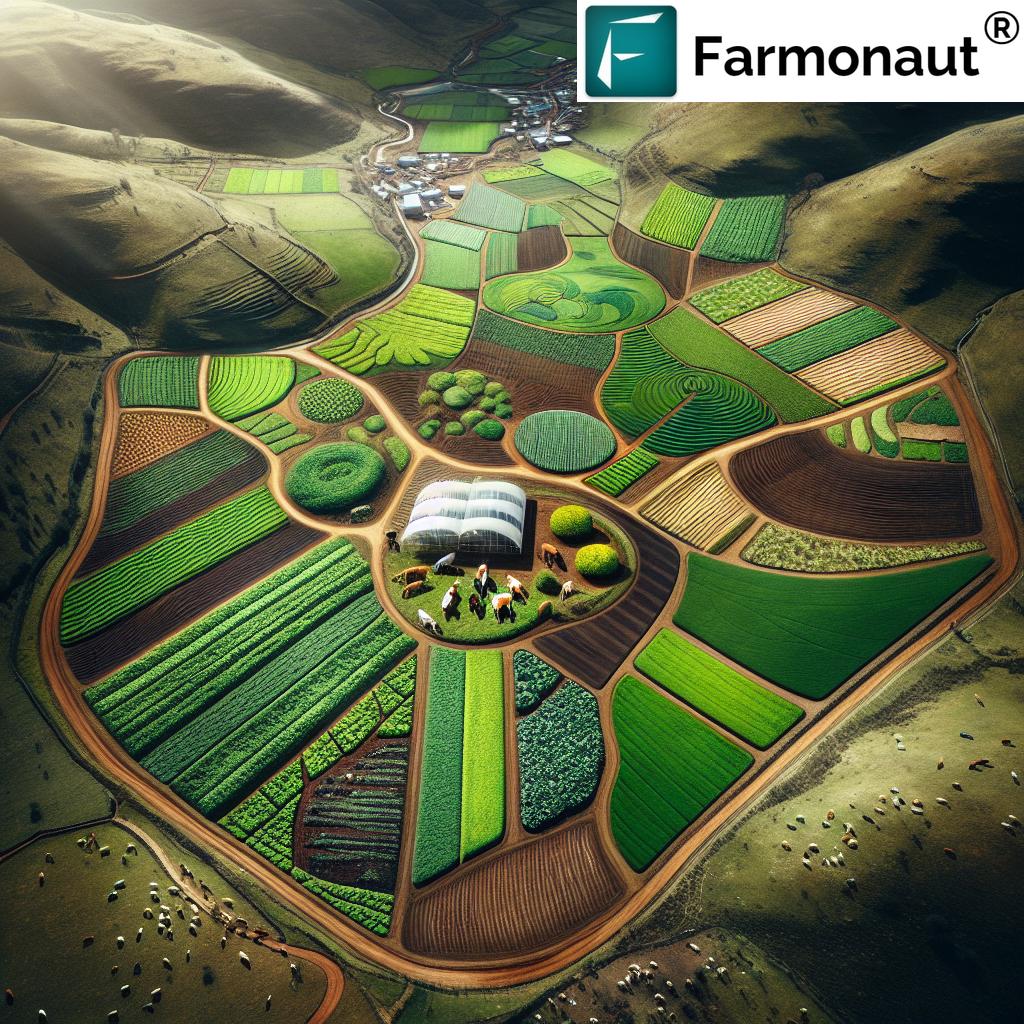Lesotho’s Agricultural Crisis: Sustainable Solutions for Food Security and Smallholder Farmer Support
“Lesotho’s agricultural crisis affects multiple sectors, with maize production and dairy farming among the top impacted areas.”

In the heart of southern Africa lies the mountainous kingdom of Lesotho, a nation grappling with a severe agricultural crisis that threatens its food security and the livelihoods of its smallholder farmers. As we delve into this pressing issue, we’ll explore the challenges faced by Lesotho’s farming community and discuss sustainable solutions that could pave the way for a more resilient agricultural sector.
The Roots of Lesotho’s Agricultural Crisis
Lesotho’s agricultural sector is facing a perfect storm of challenges. The government’s failure to provide subsidized seeds and fertilizers ahead of the planting season has left farmers in a precarious position. As early rains began in September, many found government stores empty, forcing them to resort to traditional methods that may not yield sufficient harvests.
- Shortage of subsidized inputs
- Delayed delivery of essential farming supplies
- Reliance on South African suppliers for fertilizers
- Complex procedures for acquiring subsidized inputs
These factors have culminated in a crisis that spans various agricultural sectors, from maize production to dairy farming. The situation is particularly dire in Lesotho’s highlands, where the planting season is shorter due to the mountainous terrain.
Impact on Smallholder Farmers
The crisis has hit smallholder farmers the hardest. Many have been forced to use untreated seeds and animal manure, risking lower yields and potential crop failures. In the Mokhotlong district, commercial farmer Kabelo Kabelo expressed frustration with the situation, highlighting the scramble for traditional methods as the planting season rapidly draws to a close.
In Butha-Buthe, dairy farmer Masilonyane Sefale faces the prospect of selling his cattle due to impending feed shortages. The interconnectedness of crop and livestock farming becomes painfully apparent as farmers struggle to produce enough maize to feed their animals.
The Need for Sustainable Agriculture Practices
As we face this crisis, it’s clear that Lesotho needs to adopt more sustainable agriculture practices. These practices could not only address the immediate food security challenges but also build long-term resilience in the face of climate change and resource scarcity.
Sustainable agriculture practices involve methods that protect the environment, expand the Earth’s natural resource base, and maintain and improve soil fertility. For Lesotho, this could mean:
- Implementing crop rotation to improve soil health
- Adopting conservation tillage to reduce soil erosion
- Utilizing integrated pest management to reduce reliance on chemical pesticides
- Embracing agroforestry to diversify farm outputs and improve soil stability
These practices align well with the need for climate-resilient farming strategies in Lesotho’s challenging mountainous environment.
Precision Farming: A Game-Changer for Lesotho
One of the most promising solutions for Lesotho’s agricultural crisis is the adoption of precision farming technology. Companies like Farmonaut offer advanced, satellite-based farm management solutions that could revolutionize how farming is done in the country.
Precision farming technology uses satellite imagery, AI, and data analytics to provide farmers with real-time information about their crops and fields. This technology can help farmers in Lesotho:
- Monitor crop health remotely
- Optimize resource use, including water and fertilizers
- Make data-driven decisions about planting and harvesting
- Predict and mitigate potential crop failures
By leveraging these technologies, Lesotho’s farmers could significantly improve their yields and resource efficiency, even in the face of input shortages.
Learn more about precision farming solutions

Enhancing Crop Management Techniques
To address the current crisis and build a more resilient agricultural sector, Lesotho needs to focus on improving its crop management techniques. This involves a combination of traditional knowledge and modern technology.
Crop management techniques that could benefit Lesotho’s farmers include:
- Precision seeding to optimize plant spacing and reduce seed waste
- Targeted fertilizer application based on soil analysis
- Integrated pest and disease management
- Water-efficient irrigation systems
These techniques, when combined with precision farming technology, can help farmers maximize their yields while minimizing resource use.
Rethinking Agricultural Input Subsidies
The current crisis in Lesotho highlights the need to reassess the country’s approach to agricultural input subsidies. While subsidies can be crucial for supporting smallholder farmers, the current system has shown vulnerabilities in terms of timely delivery and equitable distribution.
A more sustainable approach to agricultural input subsidies could involve:
- Developing local capacity for seed and fertilizer production
- Implementing a voucher system for more efficient distribution
- Encouraging private sector participation in input supply chains
- Promoting the use of organic fertilizers and locally-adapted seed varieties
By diversifying the sources of agricultural inputs and improving distribution systems, Lesotho can reduce its dependence on imports and ensure more reliable access for farmers.
“Over 70% of Lesotho’s land is mountainous, making sustainable agriculture practices crucial for food security in challenging terrain.”
Addressing Food Security Challenges
The agricultural crisis in Lesotho is fundamentally a food security challenge. As farmers struggle to plant and harvest crops, the nation faces the risk of widespread food shortages. Addressing this challenge requires a multi-faceted approach that goes beyond just increasing crop yields.
Key strategies for improving food security in Lesotho include:
- Diversifying crop production to reduce reliance on a single staple crop
- Developing robust food storage and distribution systems
- Promoting nutrition education to ensure balanced diets
- Supporting small-scale food processing to add value to agricultural products
By implementing these strategies, Lesotho can build a more resilient food system that can withstand shocks like the current input shortage.

The Role of Agricultural Extension Services
In addressing Lesotho’s agricultural crisis, we cannot overlook the critical role of agricultural extension services. These services act as a bridge between research institutions and farmers, disseminating knowledge and best practices.
Improving agricultural extension services in Lesotho could involve:
- Training extension officers in the latest sustainable farming techniques
- Leveraging digital technologies for remote support and information dissemination
- Establishing demonstration farms to showcase effective practices
- Facilitating farmer-to-farmer learning through community groups
By strengthening these services, Lesotho can ensure that farmers have access to the knowledge and support they need to implement sustainable practices and navigate crises.
Explore Farmonaut’s API for agricultural data
Optimizing Agricultural Supply Chains
The current crisis in Lesotho has exposed weaknesses in the country’s agricultural supply chains. Addressing these weaknesses is crucial for ensuring that farmers have timely access to inputs and can get their produce to market efficiently.
Agricultural supply chain optimization in Lesotho could focus on:
- Improving rural infrastructure, including roads and storage facilities
- Developing local agro-processing industries to reduce post-harvest losses
- Implementing digital platforms for better coordination between farmers, suppliers, and buyers
- Encouraging the formation of farmer cooperatives for collective bargaining and resource sharing
By streamlining these supply chains, Lesotho can reduce inefficiencies and ensure that agricultural inputs and outputs flow more smoothly.
Soil Fertility Management in Lesotho’s Highlands
The mountainous terrain of Lesotho presents unique challenges for soil fertility management. Erosion and nutrient depletion are constant threats, especially in the highlands where farming is particularly challenging.
Effective soil fertility management strategies for Lesotho could include:
- Implementing terracing and contour plowing to prevent soil erosion
- Promoting the use of cover crops to protect and enrich the soil
- Encouraging the application of organic matter to improve soil structure
- Using precision farming techniques to optimize fertilizer application
By focusing on these strategies, Lesotho’s farmers can maintain and improve soil health, even in challenging highland environments.
Check out Farmonaut’s API Developer Docs

Comparative Analysis: Traditional vs. Sustainable Agriculture in Lesotho
| Aspect | Traditional Practices | Sustainable Practices with Precision Farming |
|---|---|---|
| Seed Management | Use of untreated seeds, often leading to poor germination and yield | Optimized seed selection based on soil and climate data, improved germination rates |
| Soil Fertility | Reliance on animal manure, often insufficient for optimal crop growth | Precision fertilization based on soil analysis, targeted application for maximum efficiency |
| Water Management | Traditional irrigation methods, often wasteful and inconsistent | Smart irrigation systems guided by soil moisture sensors and weather forecasts |
| Crop Yield Estimates | Current yields: ~1.5 tons/hectare for maize | Potential yields with precision farming: ~3-4 tons/hectare for maize |
| Climate Resilience | High vulnerability to climate change, limited adaptive strategies | Improved resilience through data-driven decision making and diversified cropping systems |
| Food Security Impact | Current status: High food insecurity, frequent shortages | Projected improvements: Increased stability in food production, reduced import dependence |
The Path Forward: Integrating Technology and Traditional Knowledge
As we look to the future of agriculture in Lesotho, it’s clear that the path forward lies in integrating modern technology with traditional farming knowledge. This approach can help address the immediate crisis while building long-term resilience in the agricultural sector.
Key steps in this integration process include:
- Conducting workshops to introduce farmers to precision farming technologies
- Developing locally-adapted versions of advanced agricultural tools
- Creating partnerships between tech companies and local farming communities
- Establishing pilot projects to demonstrate the benefits of integrated approaches
By combining the wisdom of traditional practices with the precision of modern technology, Lesotho can create a more sustainable and productive agricultural sector.
Empowering Smallholder Farmers
At the heart of Lesotho’s agricultural transformation must be a focus on empowering smallholder farmers. These farmers form the backbone of the country’s agricultural sector and are key to achieving food security.
Smallholder farmer support initiatives could include:
- Providing access to affordable micro-financing options
- Offering training in financial literacy and farm management
- Facilitating access to markets through digital platforms
- Encouraging the formation of farmer associations for collective action
By empowering these farmers with knowledge, resources, and technology, Lesotho can build a more resilient and productive agricultural sector from the ground up.

Conclusion: A Sustainable Future for Lesotho’s Agriculture
The agricultural crisis in Lesotho presents significant challenges, but it also offers an opportunity for transformation. By embracing sustainable agriculture practices, leveraging precision farming technology, and focusing on smallholder farmer support, Lesotho can build a more resilient and productive agricultural sector.
Key takeaways for moving forward include:
- Investing in precision farming technologies to optimize resource use
- Improving agricultural extension services to disseminate knowledge effectively
- Rethinking input subsidy programs to ensure timely and equitable distribution
- Focusing on soil fertility management, especially in highland areas
- Empowering smallholder farmers through training and access to resources
As we work towards these goals, we can envision a future where Lesotho’s farms are not just productive, but also sustainable and resilient in the face of challenges. The journey ahead may be long, but with the right strategies and technologies, Lesotho can transform its agricultural sector and ensure food security for generations to come.
FAQ Section
Q: What are the main challenges facing Lesotho’s agricultural sector?
A: The main challenges include shortages of subsidized seeds and fertilizers, reliance on imports, difficult mountainous terrain, and vulnerability to climate change.
Q: How can precision farming technology help Lesotho’s farmers?
A: Precision farming technology can provide real-time crop monitoring, optimize resource use, and help farmers make data-driven decisions to improve yields and efficiency.
Q: What role do agricultural extension services play in addressing the crisis?
A: Agricultural extension services are crucial for disseminating knowledge about sustainable farming practices and new technologies to farmers across Lesotho.
Q: How can Lesotho improve its agricultural input subsidy program?
A: Lesotho can improve its subsidy program by developing local production capacity, implementing more efficient distribution systems, and encouraging private sector participation.
Q: What are some sustainable agriculture practices suitable for Lesotho’s mountainous terrain?
A: Suitable practices include terracing, contour plowing, agroforestry, and the use of cover crops to prevent soil erosion and improve soil fertility.



